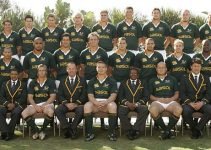The 2011 Rugby World Cup in New Zealand has provided a much needed reset switch for how the Rugby World Cup should be treated, after perhaps losing its way in 2007. One thing is certain, only World Cups hosted by a single country can hope to have the heart that rugby fans want to see in their tournaments. The grass roots, down to earth, encompassing nature of rugby is what still separates it from other leading world sports. This seems to get lost in tournaments that are split amongst host countries.

What has been striking about the 2011 tournament is how the much vaunted ‘stadium of four million’ turned into reality. Despite New Zealand’s reputation as being rugby mad across the breadth of the country, there is an increasing anti-rugby sentiment creeping through, particularly in the main centres. Perhaps such critics are sick of being marginalised, sick of being seen as a country of rugby-heads and sick of having the All Blacks as leading news; some are probably just sick of the All Blacks losing in World Cups. This vocal minority increased their voice even more in the lead up to the World Cup. What has been remarkable has been how even these detractors have been swept up in the World Cup atmosphere. One shudders to think what might have happened if Francois Trinh-Duc had not missed his 47m penalty kick in the final, perhaps a New Zealand version of the London riots.
1.9 million People watched the All Blacks v Wallabies semi final on TV; that’s nearly 90% of the possible television audience. In a city as sprawling and diverse as Auckland, 200,000 of the 1.4 million population gathered at the Waterfront for the opening World Cup game, not to mention the more than 60,000 who gathered in and around Eden Park and those that congregated at other fan zones around Auckland. Those that criticise Auckland’s infrastructure would pay to remember the unprecedented strain such a party would put on any city in the world.
Much has been made of whether or not this is the best Rugby World Cup ever. This has largely been driven by the anxious New Zealand public and media desperately seeing approval. Tournaments such as South Africa in 1995 and Australia in 2003 will always be remembered as fantastic events. Other countries will easily eclipse New Zealand in revenue and ticket sales. The grandeur of the 2011 event can at least be equalled and the general atmosphere will hopefully be repeated at future events. However, where New Zealand has truly laid down the gauntlet is the embracing of all teams 1 – 20, and particularly the lesser known rugby nations. It is in this area where both New Zealand’s diverse culture and welcoming attitude surely came to the fore. When a country like Tonga can have its supporters stop traffic when they arrive at the airport, you know we are in for a World Cup like no other. In their own countries, even teams like Italy and the United States have never received welcomes like this.
New Zealand did a great job of encompassing the new professionalism of rugby, its grass roots and New Zealand hospitality in one package while at the same time showcasing New Zealand’s much-publicised scenery. As a host, New Zealand absolutely made the most of what it had, despite having to do it against a backdrop of an economic recession and the Christchurch earthquake. Only months before kickoff Christchurch’s two quarter-final and five pool matches had to be refunded and rescheduled. While New Zealand had the advantage of an educated rugby public and having smaller stadiums to fill, countries such as England will have the advantage of more population, a stronger economy and less isolated geographic location to drive their tournaments.
However, in the same way that New Zealand’s small but rugby-mad culture made it a World Cup like no other, it certainly had its cringe-educing drawbacks too. A New Zealand rugby hive-mind tormented Wallaby Quade Cooper until both his mind and body eventually capitulated. New Zealand’s disproportionate rugby media left no stone unturned in the documenting of what the teams did in their spare time. However, with Britain’s tabloid-culture you would think England would have been better prepared for such a goldfish bowl than they clearly were.
While New Zealand may have got carried away at times, it was noticeable how many players and coaches used the opportunity in their final interview to thank New Zealand for their hospitality. Hopefully the 2011 Rugby World Cup in New Zealand is remembered for its embracing of all the different teams and reminding the world what rugby is all about. Plenty of countries will be in line to host their own great tournaments, and probably with better financial rewards. However, in the decades to come, when rugby once again needs a dose of sentimentality, the World Cup will find its way back to New Zealand.
Share:


